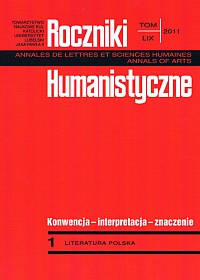Konwencja jako źródło awangardy. Uwagi o nowatorstwie dawnych poetyk
Abstrakt
Modern theoretical-literary treatises, defined as normative poetics, are usually connected with the dominance of the convention and normativism, with obligatory rules, canonical concepts and restrictive directives hampering originality. The present text tries to revise the conviction that convention is a dominant tendency in the development of the old theoretical thought; it tends to show the avant-garde aspects of modern poetics and to present the relations between what is conventional and what is innovative in the most original theoretical texts of the late Renaissance and Baroque. Examples of two avant-garde modern poetics – Francesco Patrizi's theory of wonder formed at the end of the 16th century and the 17th century Emanuele Tesauro's conceptistic theory – show that tradition and convention are necessary elements of inventive theories. The avant-garde of poetics of the past, contrary to the avant-garde of the 20th century, is not born from the defiance of the earlier theories, but is formed by way of modernizing and transforming them. Old inventive theories – despite all the departures from tradition – are still part of the classical paradigm. Hence, the avant-garde character of the late-Renaissance and Baroque theoretical reflection consists in a peculiar synergy of convention and novelty.
Copyright (c) 2011 Roczniki Humanistyczne

Utwór dostępny jest na licencji Creative Commons Uznanie autorstwa – Użycie niekomercyjne – Bez utworów zależnych 4.0 Międzynarodowe.





